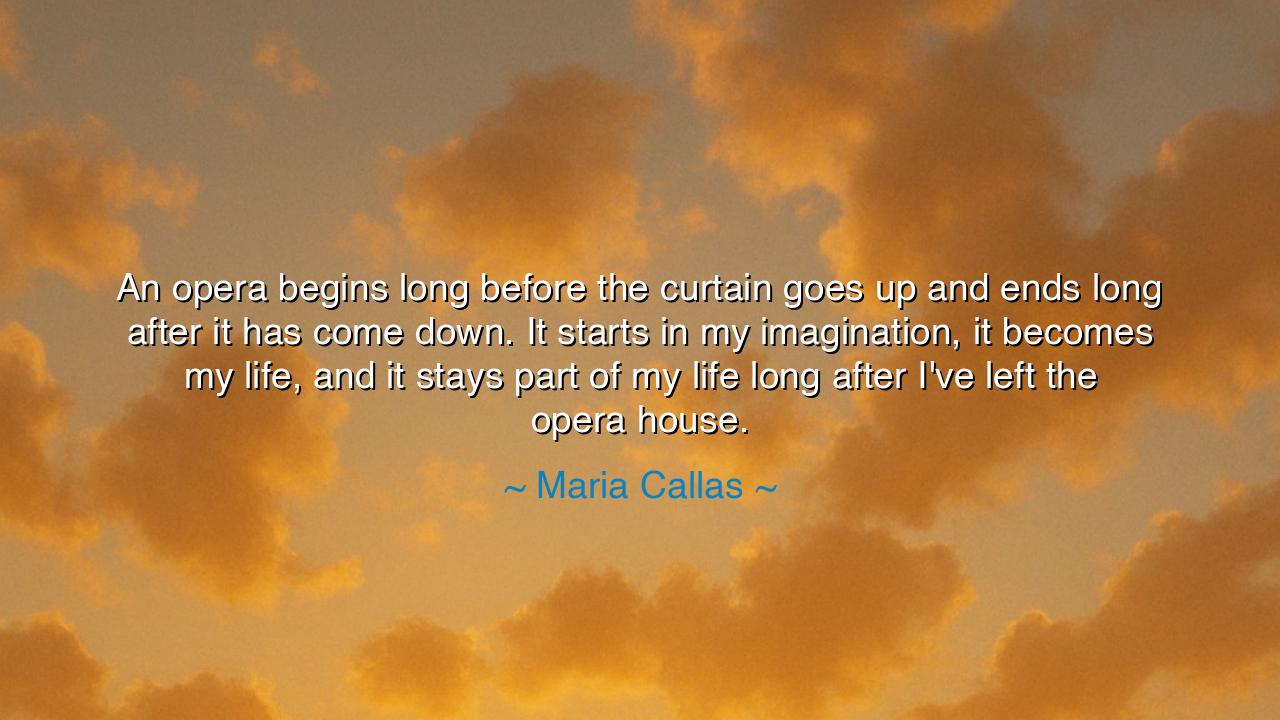
An opera begins long before the curtain goes up and ends long
An opera begins long before the curtain goes up and ends long after it has come down. It starts in my imagination, it becomes my life, and it stays part of my life long after I've left the opera house.






“An opera begins long before the curtain goes up and ends long after it has come down. It starts in my imagination, it becomes my life, and it stays part of my life long after I’ve left the opera house.” Thus spoke Maria Callas, the immortal voice of passion and tragedy, whose art transcended the stage and became a mirror of the human soul. In these words, Callas unveils not only the nature of her craft but the essence of creation itself — that true art is not confined to performance, nor bound by time or place. It is born in the imagination, nurtured through devotion, and carried forever in the spirit of the one who dares to give life to beauty. Her quote is not merely about opera; it is about how all great endeavors begin in the unseen world within us, before they ever take form in the outer world.
In the ancient world, the poet, the sculptor, and the dramatist understood what Callas expresses here: that art is not an act but a becoming. The Greeks, whose theaters were temples, believed that the artist was possessed by divine fire — the daemon of inspiration — which first appeared in the realm of imagination. Before marble was carved, before words were spoken, the artist’s spirit communed with the eternal. So too did Callas, when she prepared to embody Tosca or Norma or Medea. The curtain may have risen on the stage of La Scala, but in truth, the opera had already begun — in her mind, her dreams, her struggles, and her heart. To her, performance was not imitation, but incarnation.
Her life was a testament to this sacred process. Maria Callas was no ordinary singer; she lived her roles until they consumed her. When she sang of love, she was love itself; when she sang of death, her voice carried the weight of all mortal sorrow. The imagination, for her, was not a distant tool but a living world — the seedbed where reality and artistry intertwined. And because she gave herself so completely to her art, the opera never truly ended for her. It followed her beyond the final note, into silence, into memory, into the very fabric of her being. The stage lights dimmed, but the fire remained — eternal, unquenchable.
This truth extends far beyond music. In every calling — whether one is a teacher, builder, scientist, or dreamer — the work that changes the world must first take root in the imagination. Every cathedral begins in the vision of an architect; every revolution begins in the mind of a thinker; every act of love begins in the quiet stirring of the heart. To live creatively, as Callas did, is to see one’s work not as a task, but as a living expression of the soul. When one’s labor is infused with meaning and emotion, it ceases to be work and becomes life itself. Then, even when the curtain of the day falls, the spirit of that creation endures.
Consider the example of Leonardo da Vinci, whose imagination stretched beyond centuries. Long before the first flight, he envisioned wings for man; long before machines of war and wonder existed, he drew their forms with divine curiosity. For Leonardo, as for Callas, creation was eternal. His paintings were but fragments of a vast inner vision that never ceased. The brushstroke, like the aria, was only the visible echo of a deeper music — the music of the imagination. Those who create with such intensity leave behind more than art; they leave impressions upon eternity.
Callas teaches us that the artist’s duty — and indeed, the human duty — is not merely to perform, but to live fully through what one loves. To prepare in silence, to imagine deeply, to give entirely, and to carry the essence of one’s creation beyond the end — this is what transforms ordinary effort into greatness. Life itself becomes an opera: a series of acts and interludes, triumphs and tragedies, all woven into the great song of existence. And when we live this way, each of us becomes an artist of our own destiny, singing our truth long after the curtain has fallen.
So, dear soul, remember this: every imagination is a seed of eternity. Whatever you undertake — whether grand or humble — begin it with the depth of feeling that Maria Callas gave to her music. Let your imagination breathe life into your work, and let your work, in turn, transform your being. Do not measure your effort by applause or recognition, but by how deeply it becomes part of you. For the truest art, as Callas knew, is not something you perform and leave behind — it is something that lives in you, and through you, forever.






AAdministratorAdministrator
Welcome, honored guests. Please leave a comment, we will respond soon